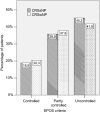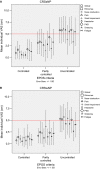Real-life study showing uncontrolled rhinosinusitis after sinus surgery in a tertiary referral centre
- PMID: 27392210
- PMCID: PMC5248621
- DOI: 10.1111/all.12983
Real-life study showing uncontrolled rhinosinusitis after sinus surgery in a tertiary referral centre
Abstract
Rationale: The European Position Paper on Sinusitis (EPOS) guidelines provide composite criteria to evaluate chronic rhinosinusitis (CRS) control, taking into consideration the severity of patients' symptoms, aspect of nasal mucosa and medical intake as parameters of CRS control.
Objectives: To study the degree of CRS control using novel EPOS control criteria at 3-5 years after a functional endoscopic sinus surgery (FESS) and correlate these data to symptoms scores.
Methods: Adult CRS patients (n = 560) who had undergone bilateral FESS for chronic inflammatory sinonasal disease 3-5 years prior to the study were included. Patients received a postal questionnaire asking for control items according to EPOS control criteria, visual analogue scale (VAS) scores for total and individual sinonasal symptoms, sinonasal outcome test (SNOT)-22 and Short Form (SF)-36 questionnaires.
Measurements and main results: About 19.5% of CRS patients were well controlled, with 36.8% of patients being partly controlled and 43.7% uncontrolled. The levels of control corresponded to mean total VAS, SNOT-22 and SF-36 scores. Subgroup analysis revealed that female gender, aspirin intolerance and revision FESS were associated with higher prevalence of uncontrolled CRS, whereas allergy, asthma and smoking status did not alter the percentage of patients in each category of control. In 81 patients attending the outpatient clinic, nasal endoscopy changed classification in only four patients (4.9%).
Conclusions: Based on the novel EPOS control criteria, at least 40% of CRS patients are uncontrolled at 3-5 years after FESS. Therefore, better treatment strategies leading to higher disease control are warranted in CRS care.
Keywords: chronic rhinosinusitis; control; functional endoscopic sinus surgery treatment; nasal polyps; uncontrolled rhinitis.
© 2016 The Authors. Allergy Published by John Wiley & Sons Ltd.
Figures


References
-
- Fokkens WJ, Lund VJ, Mullol J, Bachert C, Alobid I, Baroody F et al. EPOS 2012: European position paper on rhinosinusitis and nasal polyps 2012. A summary for otorhinolaryngologists. Rhinology 2012;50:1–12. - PubMed
-
- Schatz M, Sorkness CA, Li JT, Marcus P, Murray JJ, Nathan RA et al. Asthma control test: Reliability, validity, and responsiveness in patients not previously followed by asthma specialists. J Allergy Clin Immunol 2006;117:549–556. - PubMed
-
- Bousquet J, Bachert C, Canonica GW, Casale TB, Cruz AA, Lockey RJ et al. Unmet needs in severe chronic upper airway disease (SCUAD). J Allergy Clin Immunol 2009;124:428–433. - PubMed
-
- Hellings P, Fokkens WJ, Akdis C, Bachert C, Cingi C, de Dietz Loos D et al. Uncontrolled allergic rhinitis and chronic rhinosinusitis: where do we stand today? Allergy 2013;68:1–7. - PubMed
-
- Prokopakis EP, Vlastos IM, Ferguson BJ, Scadding G, Kawauchi H, Georgalas C et al. SCUAD and chronic rhinosinusitis. Reinforcing hypothesis driven research in difficult cases. Rhinology 2014;52:3–8. - PubMed
Publication types
MeSH terms
LinkOut - more resources
Full Text Sources
Other Literature Sources
Medical

